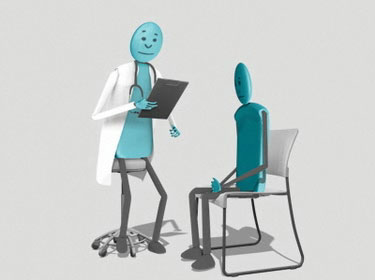Mental functions eligibility - Disability tax credit (DTC)
Disclaimer
We do not guarantee the accuracy of this copy of the CRA website.
Scraped Page Content
Disability tax credit (DTC)
- What is the DTC
- Who is eligible
- How to apply
- Our review and decision
- Claiming the credit
- Contact the CRA
Mental functions eligibility
On this page
Overview
For some people, performing everyday mental functions can be a challenge even with the help of appropriate therapy, medication, and devices. The DTC aims to offset some of the costs related to an impairment by reducing the amount of income tax you may have to pay.
Eligibility for the DTC is based on the effects of an impairment, not a diagnosis or the presence of a medical condition.
Transcript and alternative formats
Transcript
For some people, performing the mental functions necessary for everyday life may pose a challenge.
In the first example, an individual is making their third follow-up visit to the doctor with respect to being in a clinical depression for the past three months.
Doctor: "Since your last visit, has the medication that I prescribed, made any difference?"
Patient: "I feel a little more emotionally steady now, and I'm crying less than I did before. However, I'm still having significant problems with sleeping. During the day, I still have difficulty concentrating. I also find it difficult to remember to do the day-to-day essentials. When I go outside my home, I feel uncomfortable."
Doctor: "Are you still living alone?"
Patient: "Yes, but a family member and several friends will stop by or phone me a couple of times a week to chat."
Doctor: "Have you experienced any unacceptable side effects from taking the medication?"
Patient: "No."
Doctor: "Fine. Continue to take the medication and come back to see me in about a month. Of course, if any of the symptoms get worse, come back sooner."
While this individual is clearly having difficulty with some mental functions, they are still able to live alone and cannot be viewed as being markedly restricted at this point in time. The medical condition is not yet prolonged in that it hasn't lasted, nor is it expected to last, for a continuous period of at least 12 months. Therefore, this individual would not qualify for the disability tax credit.
In the second example, a parent and a small child are at a follow-up visit to the doctor to discuss the child's ongoing behavioural problems.
The child is fidgety and is looking around almost continuously.
Doctor: "It's been a couple of months since I last saw you and your child. I believe it was near the end of the school year. Have the medication and therapy that I prescribed made any difference in your child's behaviour?"
Parent: "Well, there were a few less problems at school but the biggest difference has been at home."
Doctor: "How are you feeling?"
The child is not paying attention, and is looking at different posters on the wall.
Child: "Sorry, what did you say?"
Doctor: "How are you feeling?"
Child: "Okay, I guess."
Doctor: "Are you enjoying your summer vacation and having fun playing with the other kids?"
The child looks to the parent for approval, and receives it with a nod of the head, before replying to the doctor.
Child: "Yes. I really like going to the park and playing baseball with the other kids."
Doctor: "Okay. Let's continue with the medication and therapy. Come back to see me in a couple of months."
The doctor updates his file.
Although the child's condition has been present for over a year and is likely to continue into the near future, it is improving as a result of the medication and therapy. Since there is clearly a difference between school and home, the impairment cannot be seen to exist all or substantially all of the time. Therefore, this child would not qualify for the disability tax credit.
In the third example, a patient with Type 1 diabetes is accompanied by a friend during a winter follow-up visit to the doctor.
Doctor: "It's been about a month since I last saw you. How are you feeling today?"
Patient: "Fine, thank you. I just came back from playing a round of golf."
Doctor (a bit puzzled) asks: "Were you playing at one of the indoor golf ranges?"
Patient: "No, I played 18 holes at the new golf course on the other side of town."
The doctor looks to the patient's friend for confirmation; the friend twice shakes their head from left to right. The doctor makes a note in his file and then asks the patient: "May I take a look at your diabetes logbook that you use to record your glucose levels and insulin usage?"
The patient looks towards the friend.
Friend: "I've had to do the testing, maintain the log, and give the shots."
Doctor: "Your readings have been quite high for the past few mornings. What are you typically having for breakfast?"
Patient: "I haven't eaten since yesterday."
Friend interjects, and replies to the doctor: "Today, I served a small glass of orange juice, a small bowl of oatmeal, a slice of toast, and a cup of tea."
Doctor asks the friend: "Have you noticed any improvement in your friend's short-term memory loss since she began taking the medication?"
Friend: "No, not really."
The doctor updates his file.
In the third example, the patient is suffering from a severe and prolonged impairment that affects both their adaptive functioning and their memory all or substantially all of the time. In addition, the patient is unable to live independently. Therefore, the patient would qualify for the disability tax credit.
In this third example, the individual would qualify for the DTC.
Alternative formats
Example of someone who may be eligible
Christie needs daily support and supervision

Cheryl and Christie have been together for 30 years.
A couple of years ago, Cheryl noticed Christie was becoming confused when they were out of the house and interacting with others. Now Christie is often disoriented and misunderstands situations. When grocery shopping, she needs constant reminding about what to do and help interpreting her environment.
Christie applied for the DTC. As a result of the information provided by the medical practitioner on the application form, she is now eligible for the tax credit.
As Christie has little taxable income, Cheryl may claim any unused portion of the tax credit.
Mental functions
If you have a severe and prolonged impairment that restricts your ability to perform mental functions necessary for everyday life, you may be eligible.
Mental functions necessary for everyday life
- Adaptive functioning
- Adapting to change, expressing basic needs, going into the community
- Initiating common simple transactions
- Carrying out basic hygiene or self-care activities
- Performing necessary everyday tasks
- Attention
- Showing awareness of danger and risks to personal safety
- Demonstrating basic impulse control
- Concentration
- Being able to focus on a simple task for any length of time
- Understanding and recalling information (short term)
- Goal-setting
- Making and carrying out simple plans
- Initiating everyday tasks
- Judgment
- Choosing clothing appropriate for the weather
- Making decisions about your own treatment and welfare
- Recognizing risks of being taken advantage of by others
- Understanding consequences of your actions or decisions
- Memory
- Remembering basic personal information (such as date of birth and address)
- Remembering things that are important and of interest
- Remembering simple instructions
- Perception of reality
- Showing an accurate understanding of reality
- Separating reality from delusions and hallucinations
- Problem-solving
- Identifying everyday problems
- Carrying out solutions to simple problems
- Regulating behaviour and emotions
- Behaving appropriately for the situation
- Showing appropriate emotional responses for the situation
- Controlling mood to prevent risk of harm to self or others
- Verbal and non-verbal comprehension
- Understanding and responding to non-verbal information or cues
- Understanding and responding to verbal information
Eligibility criteria checklist
Start of question
-
If you’re not sure you qualify
Even if your answers indicate that you may not be eligible, you can still send in an application. CRA will determine your eligibility based on the information given by your medical practitioner.
If you have impairments in 2 categories
You may be eligible for the DTC under the cumulative effect of significant limitations. This combines the effects of 2 limitations to be equivalent to a marked restriction in 1 category (does not include life-sustaining therapy).
Page details
2024-01-23

